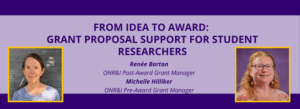
One of the hardest parts of conducting research as a student is figuring out how to pay for the related expenses (e.g., survey license fees, participant incentives). But you are not alone. The UW School of Nursing has fantastic mentors and research professionals who have successfully navigated MANY student grant applications.
 But the most important part of any grant application is knowing your why. Why apply for this grant and how does your why align with the sponsor’s priorities. Certainly, applying for a research grant as a student offers benefits that extend far beyond financial support of a research project. Some research grants (e.g., NIH F31 applications, AHA Predoctoral Fellowships) can help cover essential costs such as tuition, stipends, supplies, and travel for conferences. In addition, funded research projects often lead to opportunities for publication and presentation, allowing students to raise their professional visibility through published manuscripts, posters, and conference talks. These experiences not only build academic credibility but also connect students with faculty mentors and research teams, helping to foster valuable professional collaborations.
But the most important part of any grant application is knowing your why. Why apply for this grant and how does your why align with the sponsor’s priorities. Certainly, applying for a research grant as a student offers benefits that extend far beyond financial support of a research project. Some research grants (e.g., NIH F31 applications, AHA Predoctoral Fellowships) can help cover essential costs such as tuition, stipends, supplies, and travel for conferences. In addition, funded research projects often lead to opportunities for publication and presentation, allowing students to raise their professional visibility through published manuscripts, posters, and conference talks. These experiences not only build academic credibility but also connect students with faculty mentors and research teams, helping to foster valuable professional collaborations.
Grant-funded student-led research offers more than academic enrichment- it’s a gateway to professional development and long-term career connections. Students involved in funded projects gain experience in research design, data analysis, writing, and project management- valuable skills across nursing and healthcare roles. Just as important, working under the close guidance of a dedicated research mentor provides tailored support, expert insight, and a model for professional growth. Having a strong research mentor helps students navigate challenges, refine their ideas, and build confidence as emerging nurse scholars.
No matter your nursing program or track, exploring research funding opportunities early can be a game-changer for those interested in advancing nursing science. It allows budding nurse scholars to start building a research portfolio, further refine their academic interests, and access exclusive programs tailored for future leaders in the field.
Scholarship vs. Scholarships: What’s the Difference and Why It Matters
Sometimes navigating the grant funding ecosystem can feel more complex than decoding an ECG at 3:00 a.m. Perhaps you’ve already encountered terms like scholarships, grants, and sponsored programs, sometimes used interchangeably. While they may sound similar, they’re not the same. Understanding the difference can save you time, frustration, and missed opportunities.
Let’s start with the basics. If you’re applying for something called a scholarship, it’s easy to assume it’s just that- a scholarship. But at the university level, the term “scholarship” has a specific meaning tied to how the funding flows and what obligations come with it.
- Scholarships typically refer to funding awarded directly to an individual student. These are often merit or need-based, and you can usually submit these without institutional approval. Think of them as personal awards: you apply, you receive, and you report only if the funder asks you to. Questions about scholarships can be sent to the Office of Student and Academic Affairs (OSAA) at sonscholarships@uw.edu.
- Sponsored Programs, on the other hand, include grants and contracts that support your Scholarship. Here, the funding is awarded to the University, not the individual. These applications often require institutional sign-off, so your proposal will need to go through a formal review and approval process which can take three or more weeks. These proposals receive support from ONR&I grant managers to help with:
- Interpreting the request for applications (RFA)
- Navigating UW and sponsor policies
- Completing required sponsored forms
A great example is Sigma Theta Tau International (STTI), which offers both scholarships and grants. Depending on which one you’re applying for, the process and the level of institutional involvement can look very different.
So how do you know which path you’re on? When in doubt, reach out to ONRHelp@uw.edu. We can help determine whether institutional sign-off is needed and guide you through the appropriate steps.
Understanding these distinctions isn’t just academic, it’s practical. It helps you plan your timeline, gather proper documents, and connect with the right people. And most importantly, it ensures your application gets the attention and support it needs.
ONR&I Pre-Award Support- We’ve Got Your Back
 Now that you’ve identified your first research grant, work with the ONR&I pre-award services for comprehensive support throughout the proposal development, budgeting, and compliance process. We coordinate with institutional offices, especially the Office of Sponsored Programs (OSP), to ensure that your submission is properly authorized and timely. For a successful proposal, students should start early, ask questions, and tailor their applications to the funder’s mission. Clarity, conciseness, and storytelling are key to making a compelling case. And most importantly, students should lean on the support systems available to them – to craft polished, fundable proposals that reflect both their passion and potential.
Now that you’ve identified your first research grant, work with the ONR&I pre-award services for comprehensive support throughout the proposal development, budgeting, and compliance process. We coordinate with institutional offices, especially the Office of Sponsored Programs (OSP), to ensure that your submission is properly authorized and timely. For a successful proposal, students should start early, ask questions, and tailor their applications to the funder’s mission. Clarity, conciseness, and storytelling are key to making a compelling case. And most importantly, students should lean on the support systems available to them – to craft polished, fundable proposals that reflect both their passion and potential.
Post-Award Support- Keeping you on Track
Once your research proposal is funded, you will work with a member of the ONR&I post-award professional team (Cheery, Tessa, Ron or Renée). As your post-award grants specialist, we will initiate set-up of your budget in the official systems. Then we’ll work with you to track your grant spending by providing monthly reports and forecasting. We encourage regular planning discussions so any purchases you need can be accomplished in plenty of time and using official UW financial channels (rather than with your own personal funds). We’ll also review reporting requirements and sponsor deadlines with you and help you navigate any required changes to your grant.
The Office of Nursing Research & Innovation (ONR&I) is here to support you in preparing strong, competitive research proposals. We’re enthusiastic about partnering with you and committed to being a resource in your academic and professional success. Whether you’re just getting started or refining your ideas, don’t hesitate to reach out to ONRhelp@uw.edu for general questions; we’re here to help!